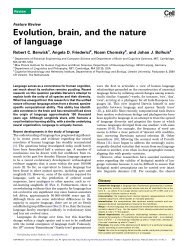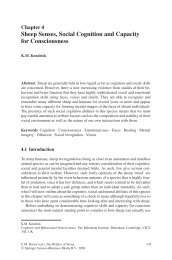Ulric Neisser
Ulric Neisser
Ulric Neisser
Create successful ePaper yourself
Turn your PDF publications into a flip-book with our unique Google optimized e-Paper software.
conference, The School Achievement of Minority Children (1986). Over the years a number of<br />
Black professionals have told me that it was important for them, but I've never met a White<br />
person who claims to have read it.<br />
Where memory was concerned, I was again fortunate. One day out of a clear blue sky I<br />
received a flyer announcing an upcoming conference on "Practical Aspects of Memory," to be<br />
held in Cardiff, Wales. Eager to go, Doug Herrmann and I (1978) submitted a modest empirical<br />
paper. (Doug was then teaching at Hamilton College and often attended my graduate seminar.)<br />
At that time I still enjoyed some name recognition; when the conference organizers saw that<br />
<strong>Ulric</strong> <strong>Neisser</strong> had submitted a paper, they asked me to give the keynote address as well. Seizing<br />
the opportunity to establish a genuinely ecological approach to the study of memory, I presented<br />
a talk called "Memory: What are the important questions?" (1978). The bottom line was the<br />
claim (quite true at the time) that "...If X is an interesting or socially important aspect of<br />
memory, then psychologists have hardly ever studied X." The conferees loved it.<br />
John Dean's memory<br />
Perception - at least the perception of the immediate environment - is generally reliable<br />
and accurate. This is not the case for memory: innumerable studies of eyewitness testimony have<br />
shown that even very confident memories can be wrong. But they are not always wrong, are<br />
they? Surely some witnesses must be right. This line of thought eventually led me to a famously<br />
accurate witness: John Dean, Richard Nixon's White House counsel of Watergate fame. Dean's<br />
testimony before the committee that was investigating Watergate - testimony about<br />
conversations with President Nixon - was so rich and detailed that he was dubbed "the human<br />
tape recorder." But it later turned out (amazingly!) that a real tape recorder had been running<br />
during those same conversation, and some of the transcripts were soon in the public domain.<br />
Intrigued by this opportunity to study a genuinely accurate witness, I set out (1981) to compare<br />
Dean's testimony with the corresponding transcripts.<br />
The comparison didn't go as I had expected: the human tape recorder failed the test. In<br />
many cases Nixon simply hadn't said what Dean later remembered him as saying, at least not in<br />
the context to which Dean attributed it. Yet there was also a sense in which Dean was quite right:<br />
there really was a cover-up, Nixon really did approve of it. What kind of memory was this,<br />
wrong on the surface but right in a deeper sense? Endel Tulving's (1972) distinction between<br />
semantic and episodic memory was then very popular, but it didn't quite fit here. Dean's<br />
recollections seemed to be episodic, but were not. Still believing that I could coin useful new<br />
terms as I had done years before in Cognitive Psychology (e.g., "iconic" and "echoic" memory), I<br />
called Dean's memories "repisodic": they represented a repeated set of events. It never caught<br />
on.<br />
Memory Observed<br />
My next step was to prepare a volume of readings and commentary that would show how<br />
interesting the ecological study of memory could be. This was Memory Observed (1982), which I<br />
wrote - "assembled" might be a better word - during a 1980-8 1 sabbatical at the University of<br />
Pennsylvania. I enjoyed the whole process: picking out the selections, writing brief connecting<br />
commentaries, putting it all together. In many ways, my goals for Memory Observed were<br />
similar to those that had generated Cognitive Psychology fifteen years earlier. Once again I was<br />
trying to change the direction of psychology, albeit on a smaller scale. This time, however, I had<br />
no subsequent regrets. The ecological study of memory has developed much as I hoped that it<br />
13




